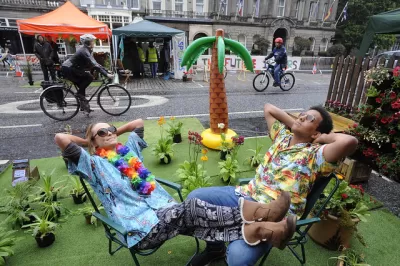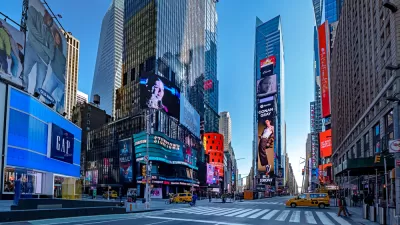Cities have survived terrible infectious diseases before, because the power of concentrated human and economic activity is just so strong. When it’s time to reopen U.S. cities, a few key actions will ensure the future safety and health of all.

Richard Florida and Steven Pedigo write on the inevitability of cities opening for business after the coronavirus has subsided, and what steps cities can take to reopen safely, and prevent future outbreaks of this pandemic of other deadly diseases in the future.
Our mayors, governors, and community leaders must do whatever is necessary to get their cities back up and running as soon as they safely can. After, we will need plans in place to prepare for future pandemics, and any social or economic lockdowns they necessitate. The federal government must do its part too, with bold and unprecedented programs to bolster the economic situation of our states and cities as well as our workers and business, especially small business.
The article includes a few key recommendations for how to accomplish those goals, like modifying vital infrastructure, readying key anchor institutions, supporting “Main Street,” and more, with a lot more detail included in the source article.
FULL STORY: How our cities can reopen after the COVID-19 pandemic

Maui's Vacation Rental Debate Turns Ugly
Verbal attacks, misinformation campaigns and fistfights plague a high-stakes debate to convert thousands of vacation rentals into long-term housing.

Planetizen Federal Action Tracker
A weekly monitor of how Trump’s orders and actions are impacting planners and planning in America.

In Urban Planning, AI Prompting Could be the New Design Thinking
Creativity has long been key to great urban design. What if we see AI as our new creative partner?

King County Supportive Housing Program Offers Hope for Unhoused Residents
The county is taking a ‘Housing First’ approach that prioritizes getting people into housing, then offering wraparound supportive services.

Researchers Use AI to Get Clearer Picture of US Housing
Analysts are using artificial intelligence to supercharge their research by allowing them to comb through data faster. Though these AI tools can be error prone, they save time and housing researchers are optimistic about the future.

Making Shared Micromobility More Inclusive
Cities and shared mobility system operators can do more to include people with disabilities in planning and operations, per a new report.
Urban Design for Planners 1: Software Tools
This six-course series explores essential urban design concepts using open source software and equips planners with the tools they need to participate fully in the urban design process.
Planning for Universal Design
Learn the tools for implementing Universal Design in planning regulations.
planning NEXT
Appalachian Highlands Housing Partners
Mpact (founded as Rail~Volution)
City of Camden Redevelopment Agency
City of Astoria
City of Portland
City of Laramie





























